Transferts monétaires à usages multiples
Les transferts monétaires à usages multiples sont des transferts monétaires non affectés que les personnes vivant en situation de crise peuvent utiliser pour couvrir leurs besoins essentiels. Par nature, il s’agit de la modalité d’aide qui offre le plus de choix, de flexibilité et de dignité aux bénéficiaires. De plus en plus de données montrent qu’il est plus pertinent en termes d’optimisation des coûts et de rapport coût/résultat de répondre à plusieurs besoins à la fois.
Cependant, cette modalité exige aussi des acteurs humanitaires qu’ils mettent en place de nouvelles manières de collaborer, à toutes les étapes du cycle de programme, et entre secteurs. Même s’il existe des outils fiables pour faciliter la collaboration, ils ne sont pas mis en œuvre à grande échelle et le recours aux transferts monétaires à usages multiples est encore ponctuel. Il reste à relever plusieurs défis si nous souhaitons intégrer efficacement les transferts monétaires à usages multiples au système humanitaire.
Contenu associé
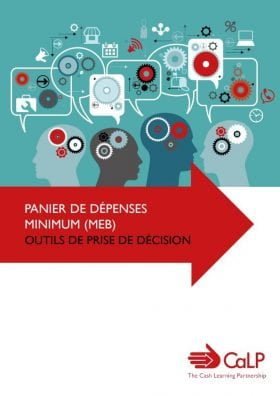
Panier de dépenses minimum (MEB) – Outil de prise de décision
Guides et outils
Cet outil de prise de décision est fait pour accompagner les praticiens et les décideurs à travers les étapes clés du processus de calcul du MEB. Elle décrit les différentes étapes et approches possibles du processus d’élaboration du MEB, et donne des liens vers de nombreuses ressources complémentaires.

Orientations opérationnelles et boîte à outils pour les transferts monétaires à usages multiples
Guides et outils
Les présentes orientations opérationnelles et la boîte à outils qui l’accompagne réunissent une expertise mondiale sur les interventions monétaires. Elles apportent aux acteurs humanitaires des orientations complètes et pratiques afin d’évaluer la faisabilité des transferts monétaires, d’en déterminer la conception et d’en structurer la mise en oeuvre. Les...

Définition des Paniers de Dépenses Minimum (MEB) en Afrique de L’Ouest
Rapport
Au cours de l’année 2017, 5 pays d’Afrique de l’Ouest ont lancé un travail collectif de définition du panier de dépenses minimum, afin de mieux comprendre la contribution de l’aide humanitaire à la couverture des besoins de base des populations affectées et d’améliorer son impact. Ce processus, souvent fastidieux, a soulevé des défis techniques, mais également mis en...
Thematic lead
Latest

Cash and Voucher Assistance for Protection Outcomes in Mine Action Tip Sheet
Guidelines and Tools
Cash and Voucher Assistance (CVA) can be an effective means, where feasible and appropriate, to improve protection outcomes for individuals, households and communities affected by the presence of Explosive Remnants of War (ERW). However, use of CVA within humanitarian Mine Action (MA) sector has been...

Child Protection and Cash and Voucher Assistance Tip Sheet
Guidelines and Tools
This tip sheet includes key terminology and messages, a summary of the latest available evidence and various tips on strategy, programme design and cycle management in respect of using Cash & Voucher Assistance (CVA) as an assistance modality for Child Protection outcomes. A list of key related resources...

Concept Note: A purpose-driven global fund for scaling digital cash transfers to accelerate progress on ending extreme poverty by 2030
Policy paper
Advances a call for the creation of a new global fund dedicated exclusively to scaling digital cash transfers across low-income countries to accelerate progress on ending extreme poverty by 2030—a structure that would be very similar to GAVI. The working group is building on ideas put forward by...

“No-one has ever helped me like this.” User journeys of cash recipients in Ukraine
Case Study
Russia‘s full-scale invasion of Ukraine in February 2022 has caused a severe
humanitarian crisis – with widespread displacement, destruction of infrastructure, and
an urgent need for humanitarian assistance. In response, the humanitarian community
has supported the Ukrainian government to initiate...
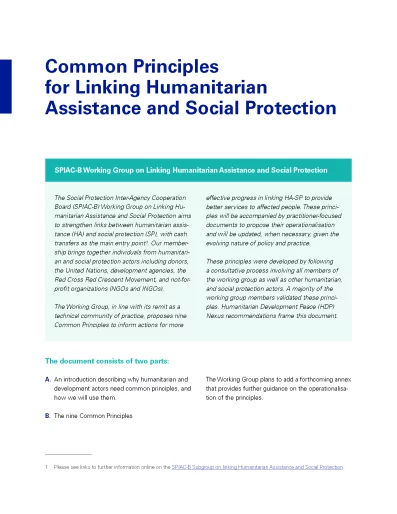
Common Principles for Linking Humanitarian Assistance and Social Protection
Policy paper
The Social Protection Inter-Agency Cooperation Board (SPIAC-B) Working Group on Linking Humanitarian Assistance and Social Protection aims to strengthen links between humanitarian assistance (HA) and social protection (SP), with cash transfers as the main entry point. Our membership brings together...

Framework for Greening Humanitarian Action in the Pacific
Guidelines and Tools
The Pacific region is highly vulnerable to the increasingly frequent and severe disasters caused by natural hazards, including extreme weather and climate change. Whilst humanitarian responses to these disasters are increasing proportionally, their own negative impacts must be reduced. Incorporating...

Just in Time: Advancing anticipatory cash in Pakistan
Guidelines and Tools
Cash and voucher assistance in humanitarian response has grown significantly in recent years, with evidence showing that it supports the agency of recipients, reduces harmful coping strategies, supports local economies, and is a cost-effective form of humanitarian assistance.
The use of cash as a form...
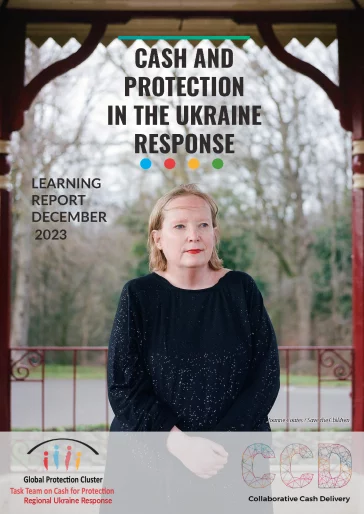
Cash and Protection in the Ukraine Response
Report
This learning report stems from bilateral discussions with the Collaborative Cash Delivery (CCD) Network’s members in Ukraine and Poland, many of whom were on the cusp of designing or implementing C4P programmes as part of the Ukraine response and were seeking learning and experience from each other.

Cash – How Can We Unlock its Real Potential?
Podcast
In receny years, cash has been changing the humanitarian system, but how have these shifts truly impacted the people affected by crisis? And what changes need to happen if cash is going to reach its full potential? In this episode, we embark on an eye-opening journey with our dynamic duo of guests, Meg...

Is Cash the Key to More People Centred Aid?
Podcast
In this episode we ask what people-centered aid looks like in practice, particularly when we think about cash and voucher assistance? With our three guests, we explore if people centred aid is different or is just a new buzz-phrase. Most importantly we explore the role cash could play in achieving more...

Can Cash Make the Humanitarian System More Accountable?
Podcast
In this episode we explore accountability issues within the humanitarian system, their root causes and potential solutions. We ask if cash and voucher assistance has a part to play in improving accountability, and what that could look like.

Is Large-scale Cash Compatible with Locally Led Response?
Podcast
In this episode, we challenge the idea that locally led response and large-scale CVA are incompatible. We explore the myths around local actors and the barriers to further progress.

Will New Technologies Help Deliver More and Better Cash?
Podcast
Technology brings new opportunities, risks, and dilemmas for the humanitarian system. In this episode, we explore these issues, and question whether the combination of technology and cash could bring transformative change and finally make aid more people-centered.

What is stopping cash from transforming humanitarian aid?
Podcast
Over six episodes, Series 2 of CashCast explores what’s holding humanitarian cash assistance back from reaching its full potential: Where has change flourished or faltered? And what can we do about it? Together, with our seven fascinating guests, we delve into issues around CVA transformative change,...

Can Cash Change the Humanitarian System?
Podcast
In this episode we reflect on how far cash has changed the humanitarian system. We question whether it has lived up to early expectations or whether the system is using cash without fundamentally changing. What's needed to make the humanitarian system better at responding to needs and preferences of...
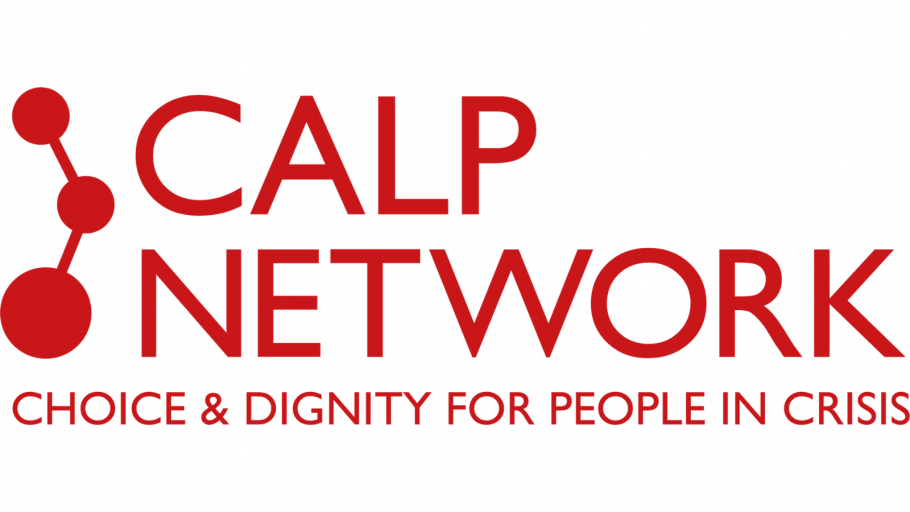
CALP Network Board Meeting
Members event
The Board provides strategic leadership and operational oversight of CALP. The CALP Board is comprised of between 7 and 13 voting members, who are drawn from CALP member organisations or are independent members of the CALP Network. The Board operates on the basis of the Operational Framework and Code of...

Will our Opinion Matter? Community consultations on the design of multi-purpose cash programmes in Lebanon
Report
Since late 2019, Lebanon has been grappling with a severe economic and financial crisis. The Lebanese lira has lost more than 98 percent of its value, and over half of the Lebanese population is estimated to be living in poverty. The Government of Lebanon and development and humanitarian agencies have...
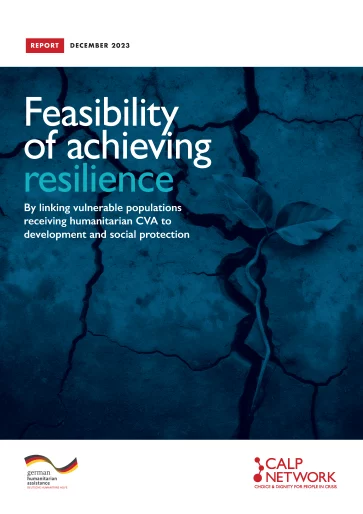
Feasibility of Achieving Resilience by Linking Vulnerable Populations Receiving Humanitarian CVA to Development and Social Protection
Report
This report evaluates the capacities for establishing linkages between humanitarian CVA and state-led social protection in Iraq, Libya and Yemen.

How do Labels and Vouchers Shape Unconditional Cash Transfers? Experimental Evidence from Georgia
Report
We implemented a randomized control trial in Georgia to study how labels and food vouchers affect household expenditure among low-income recipients of unconditional cash transfers. Households were randomly assigned to receive only an unconditional cash transfer, a label indicating an amount intended for...

Cash Assistance for GBV Survivors Receiving Case Management in Indonesia
Case Study
In partnership with Johns Hopkins University, UNFPA conducted an evaluation study on cash assistance for GBV Survivors receiving Case Management in Indonesia. The evaluation study was conducted to understand the impact of the cash assistance on safety, health, and uptake of services of GBV survivors in...




